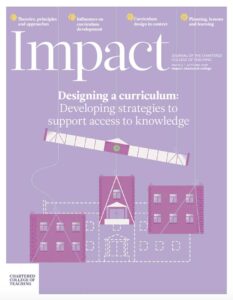Gloucester Road Primary School in Cheltenham has been on a considerable journey over the last 10 years. In 2008, it was in special measures. A new head and senior leadership team took up their posts four years ago, and in July 2017 the school received its very first Ofsted ‘outstanding’. The reasons for this success are many and varied, and include things such as embedding research-based practice; nurturing a growth mindsetThe theory, popularised by Carol Dweck, that students’ beliefs about their intelligence can affect motivation and achievement; those with a growth mindset believe that their intelligence can be developed; effective use of teaching assistants; changing feedback and the use of questioning; and ensuring all children have access to music and sport – but at the heart of its success is the curriculum design put in place across the school.
Evidence-based research, gleaned from studies in this country and abroad, inspired the school to introduce the D.E.E.P. curriculum (Designed for challenge, Experiential, Environmental immersion, Projects). This focuses on going ‘narrow and deep’ (Oates, 2011) by offering a narrower range explored in greater depth. The approach has been designed to build on knowledge and skills with opportunities for repetition and consolidation, and involves strategic mapping out of the curriculum so that learning by the pupils is not overloaded (De Jong, 2010). It has contributed to raising standards, creating a love of learning and developing a set of core skills, including resilience, teamwork, problem-solving, resourcefulness, commitment and learning from mistakes. It all provides numerous opportunities for children to demonstrate their learning in a variety of different ways.
REAL projects
At the heart of the curriculum are the ‘real’ projects (Rigorous, Engaging, Authentic, Learning).
These projects must be based on an essential question with significant content. They must have a critical element for the children, have an opportunity for some kind of public exhibition and involve the children with an authentic audience in some way. Examples of some ‘real’ projects include:
- How far has your roast dinner travelled?
- Are all English people immigrants?
- Should there be one leader over one land?
- Together, what can be built that will last for ages?
- What is a community, and why is it important?
- How can we create a biome different to our own?
All staff ‘map out’ their projects for the term, laying out key questions, content, milestones, outcomes, in and out-of-school activities, and opportunities to develop skills such as critiquing and redrafting made explicit. The Year 6 children recently undertook a project all about chocolate and Fair Trade, which included – amongst other things – study of land use, economic activities and patterns of trade related to cocoa beans; persuasive writing around fair trade; comparison of human activity in two different countries; conducting fieldwork and market research; a presentation on fair trade from a visiting speaker; and the opportunity to design and develop chocolates and packaging for a cafe and market for parents.
The D.E.E.P curriculum principles
The D.E.E.P curriculum is built on the following principles:
- Themes are driven by leading questions, producing outcomes that have a real purpose and are exhibited to a wider, authentic audience beyond the school (Alexander, 2017)
- The D.E.E.P. curriculum focuses on fewer things in greater depth, and is designed so that quality time on key concepts ensures deeper learning (Rule, 2006)
- Key experiences relate directly to the theme and projects. They are exciting, adventurous and inspiring, whilst delivering essential content
- Learners are central to experiences, activities and projects. We ensure all children know what they are doing and why!
- The curriculum is designed and centred on children’s needs and is relevant to their life experiences
- Total environmental immersion, from the corridors to the classrooms and through to the outdoor provision, engages and inspires learners.
Raising standards
A year on from introducing this type of curriculum, it is now possible to start to see the impact it is having on raising standards, creating a love of learning and developing a set of core skills for future learning. Staff are very careful not to simply use the term ‘21st-century skills’ – the children may well need them for the 21st century, but they are skills that have been required well before this date, and they will also be needed long into the future.
One cannot be certain about what kinds of jobs and careers will exist in the future for the pupils but they could be expected to work and research in different ways, and so flexibility and adaptability also drive our curriculum. It has been very important to staff that the children have opportunities to demonstrate their learning in different ways throughout each topic and each project. What has been the impact? In the words of the school’s recent Ofsted inspection:
Pupils learn exceptionally well. Behaviour is exemplary. Pupils love coming to school and are excited and enthused by the lessons. Pupils benefit from a very broad curriculum that is based around providing REAL experiences and is enhanced by a wide range of trips and visits. By rooting learning in exciting and relevant experiences, pupils are able to understand better and produce higher-quality work. Pupils take responsibility for their own learning and love the challenges that they are set by the teachers.












